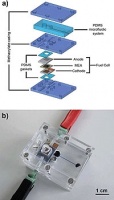Team develops lab-on-a-chip device featuring micro fuel cell
Researchers have built a completely autonomous lab-on-a-chip device, which has an integrated micro fuel cell.

Methanol fuel is used to power the electronics while carbon dioxide (CO2), produced as reaction by-product, pumps the liquid analytes around the channels.
Microfluidic technologies have been touted for some time, and while small devices have been demonstrated they typically rely on large and expensive external equipment such as compressors and various electronic components.

This essentially renders them unsuitable for applications such as point-of-care diagnostics and field work in developing nations.
Around six years ago, a team of Spanish researchers from the National Centre for Microelectronics (CNM) in Barcelona came across the lab-on-a-chip problem.
‘We attended two or three microTAS [Micro Total Analysis Systems] conferences and saw that there were many platforms and a lot of technologies but not many commercial products,’ Dr Neus Sabaté of the CNM told The Engineer.
‘The two main reasons seemed to be the lack of autonomy of these devices and the lack of consensus of which was the best technology to put everything together.’
Register now to continue reading
Thanks for visiting The Engineer. You’ve now reached your monthly limit of news stories. Register for free to unlock unlimited access to all of our news coverage, as well as premium content including opinion, in-depth features and special reports.
Benefits of registering
-
In-depth insights and coverage of key emerging trends
-
Unrestricted access to special reports throughout the year
-
Daily technology news delivered straight to your inbox










Water Sector Talent Exodus Could Cripple The Sector
Maybe if things are essential for the running of a country and we want to pay a fair price we should be running these utilities on a not for profit...